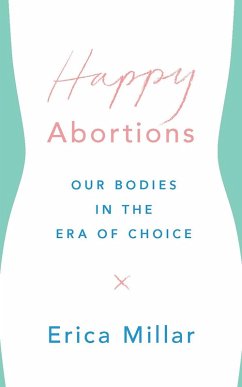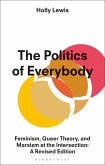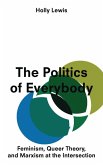'A provocative and important book that every pro-choice advocate should read.'
Sinéad Kennedy, Coalition to Repeal the 8th Amendment
When it comes to abortion, today's liberal climate has produced a common sense that is both pro-choice and anti-abortion. The public are fed an unchanging version of what the abortion choice entails and how women experience it. While it would prove highly unpopular to insist that all pregnant women should carry their pregnancy to term, the idea that abortion could or should be a happy experience for women is virtually unspeakable.
In this careful and intelligent work, Erica Millar shows how the emotions of abortion are constructed in sharp contrast to the emotional position occupied by motherhood - the unassailable placeholder for women's happiness. Through an exposition of the cultural and political forces that continue to influence the decisions women make about their pregnancies - forces that are synonymous with the rhetoric of choice - Millar argues for a radical reinterpretation of women's freedom.
Sinéad Kennedy, Coalition to Repeal the 8th Amendment
When it comes to abortion, today's liberal climate has produced a common sense that is both pro-choice and anti-abortion. The public are fed an unchanging version of what the abortion choice entails and how women experience it. While it would prove highly unpopular to insist that all pregnant women should carry their pregnancy to term, the idea that abortion could or should be a happy experience for women is virtually unspeakable.
In this careful and intelligent work, Erica Millar shows how the emotions of abortion are constructed in sharp contrast to the emotional position occupied by motherhood - the unassailable placeholder for women's happiness. Through an exposition of the cultural and political forces that continue to influence the decisions women make about their pregnancies - forces that are synonymous with the rhetoric of choice - Millar argues for a radical reinterpretation of women's freedom.

Erica Millar über Vorbehalte gegenüber Frauen, die ihre Schwangerschaft abbrechen
"Happy", also womöglich lustig-vergnügt nach einer Abtreibungsentscheidung? Der Titel der deutschen Übersetzung verschärft eine gewollte Provokation. Wenn sich über Geburten nach erwünschter Schwangerschaft mit der Mutter die ganze Umgebung freut: Warum sollte dann nicht auch eine abgewendete ungewollte, nämlich rechtzeitig abgebrochene Schwangerschaft ein Anlass zur Freude sein? Zählt hier das Lebensglück einer Frau plötzlich nicht mehr?
Im Englischen meint "happy" allerdings nicht zwingend Partystimmung, sondern so etwas wie "unbeschwert", "gelöst", "erleichtert". Und darum geht es der Sozialwissenschaftlerin Erica Millar in ihrem - im Übrigen mit viel Zahlenmaterial argumentierenden, stocknüchternen - Buch: In den meisten westlichen Ländern sind Schwangerschaftsabbrüche zwar legal und als medizinische Dienstleistung komplikationslos möglich. Selbst Kritik an dem, was Gegner einer selbstbestimmten Schwangerschaft immer noch Abtreibung nennen, zielt selten darauf, Abbrüche (abermals) zu kriminalisieren. Dennoch hat sich, und zwar erst nach der Liberalisierung des Schwangerschaftsabbruchs, ein "emotionales Skript" festgesetzt, dem zufolge eine Frau, die abtreibt, ihre Entscheidung mit psychischem Schmerz, vielleicht sogar lebenslanger Trauer bezahlen muss.
Das Konstrukt eines post abortion syndrome, eines Krankheitsbildes womöglich sogar, geistert durch die - oft fragwürdige - Literatur zum Thema. Und empirische Befragungen, die zeigen, dass die meisten Frauen Schwangerschaftsabbrüche als einen durchaus normalen, hilfreichen, auch rettenden kleinen Eingriff erleben, der ihnen schlichtweg das Leben sichert, das sie führen wollen - keine ungewollte Mutterschaft, nicht noch ein weiteres Kind, kein Kind vom fraglichen Mann (...) -, werden öffentlich ignoriert.
Millar recherchiert am Fallbeispiel Australien akribisch nach, wie es Abtreibungskritiker/innen sowie Lebensschutz-Vereinigungen gelungen ist, das Bild der Frau, die selbst entscheidet, durch einen Diskurs über Emotionen zu überformen. Die unfreiwillig schwangere Frau wird zur "Mutter" eines Fötus umdefiniert, der geopfert wird und dessen "Verlust" mit Trauer, Schmerz, Schuld, Scham einhergeht. Die Entscheidung selbst erscheint als eine, die lediglich im gefühlsmäßigen Ausnahmezustand getroffen werden kann.
Und Frauen, denen der Abbruch leichtfällt, werden als gefühllos oder unweiblich pathologisiert. Hinzu kommt eine verlogene, weil rassistische Seite abtreibungskritischer Debatten: Nur zu oft geht es darum, dass weiße Mittelschichtsfrauen Kinder "behalten" sollen, während man Abbrüche bei schwarzen und/oder armen Müttern als "verständlich" einstuft. Ebenso misst die politische Sprache, wenn es um Föten mit Fehlbildungen geht, mit zweierlei Maß.
Grob gesagt, treibt weltweit jede dritte Frau in ihrem Leben mindestens einmal ab. In Ländern mit restriktiven Abtreibungsregelungen wird sogar häufiger abgetrieben als in Ländern mit liberalen Regelungen. Jährlich kommen um die fünf Millionen Frauen nach improvisierten Schwangerschaftsabbrüchen ins Krankenhaus, 47 000 sterben an ihnen, zumeist dort, wo Abbrüche unter Strafandrohung stehen. Wo Schwangerschaftsabbrüche gut und verlässlich möglich sind, sinken dagegen tendenziell die Fallzahlen, und Todesfälle gibt es faktisch keine mehr.
Was aber nicht besteht, ist die Akzeptanz der Entscheidung zum Abbruch. Doch können Schwangerschaftsabbrüche nicht eine gute Wendung des eigenen Lebens sein? Millar rät zu kämpferischer Sprachpolitik. Sie verweist auf Netzkampagnen, die englischsprachige Aktivistinnen initiierten, wie "#ShoutYourAbortion" oder "1 in 3", in denen Betroffene ihre persönliche (positive) Geschichte mit einer beendeten Schwangerschaft dokumentieren. Sie warnt aber auch davor, den Diskurs rund um die individuellen Gefühle einfach nur umzukehren.
Nicht alle australischen Befunde lassen sich auf die deutsche Situation übertragen. Auch ist das Buch von Redundanzen nicht frei, und man vermisst - etwa zur politischen Zäsur durch den medikamentösen Abbruch mittels RU-486, was Australien angeht - Details. Dennoch lohnt die Lektüre. Und Millar prägt ein neues Wort: Frauen ohne Kinder sind nicht - als mangele es ihnen an etwas - "kinderlos", sondern kinderfrei.
PETRA GEHRING
Erica Millar: "Happy
Abortions". Mein Bauch
gehört mir - noch lange nicht.
Aus dem Englischen von Stephanie Singh. Gekürzte und überarbeitete Ausgabe. Wagenbach Verlag, Berlin 2018. 224 S., br., 24,- [Euro].
Alle Rechte vorbehalten. © F.A.Z. GmbH, Frankfurt am Main
'The meanings ascribed by society to women's reproductive decisions do not necessarily portray our actual emotions. Erica's book celebrates that abortion, like childbirth, can be a joyful experience when achieving reproductive justice through human rights.'
Loretta Ross, co-founder, SisterSong Women of Color Reproductive Justice Collective
'An exciting and unique addition to the literature on reproductive choice. It challenges the framing of abortion across the political spectrum and throughout the modern world, and forces a reappraisal of our thinking. Furthermore - it's a darn good read!'
Ann Furedi, Chief Executive, British Pregnancy Advisory Service
'A provocative and important book that every pro-choice advocate should read. Millar reminds us that abortion is a normal fact of life and a social good. This shouldn't be a radical claim but, in a world where abortions rights are under attack, it is.'
Sinéad Kennedy, Secretary, Coalition to Repeal the Eighth Amendment (Ireland)
'An important contribution to the literature on abortion. Millar's evocative book critically examines political and movement discourses, with attention to gender, race, class, and nation, exposing the anti-abortion framings that permeate all sides of the debate.'
Katrina Kimport, Bixby Center for Global Reproductive Health, UCSF
'This compelling dissection of the emotional common sense of abortion offers a crucial step towards rejecting the "awfulization" of abortion. Ending a pregnancy is revealed for what it has always been: an inevitable and normal part of women's lives.'
Sally Sheldon, Kent University
'In this thoughtful and well-written book, Erica Millar deconstructs the emotional discourses surrounding abortion. A sophisticated and timely work that should be essential reading for all those interested or working in the area of abortion, as well as activists and academics.'
Pam Lowe, Aston University
'Offers a carefully crafted bundle of feminist ideas that enable new insights into the politics of choice. Invaluable reading for students, scholars, and abortion activists seeking to deploy feminist analysis in service of the urgent need to enable and improve access to abortion for all who need it.'
Barbara Baird, Flinders University
Loretta Ross, co-founder, SisterSong Women of Color Reproductive Justice Collective
'An exciting and unique addition to the literature on reproductive choice. It challenges the framing of abortion across the political spectrum and throughout the modern world, and forces a reappraisal of our thinking. Furthermore - it's a darn good read!'
Ann Furedi, Chief Executive, British Pregnancy Advisory Service
'A provocative and important book that every pro-choice advocate should read. Millar reminds us that abortion is a normal fact of life and a social good. This shouldn't be a radical claim but, in a world where abortions rights are under attack, it is.'
Sinéad Kennedy, Secretary, Coalition to Repeal the Eighth Amendment (Ireland)
'An important contribution to the literature on abortion. Millar's evocative book critically examines political and movement discourses, with attention to gender, race, class, and nation, exposing the anti-abortion framings that permeate all sides of the debate.'
Katrina Kimport, Bixby Center for Global Reproductive Health, UCSF
'This compelling dissection of the emotional common sense of abortion offers a crucial step towards rejecting the "awfulization" of abortion. Ending a pregnancy is revealed for what it has always been: an inevitable and normal part of women's lives.'
Sally Sheldon, Kent University
'In this thoughtful and well-written book, Erica Millar deconstructs the emotional discourses surrounding abortion. A sophisticated and timely work that should be essential reading for all those interested or working in the area of abortion, as well as activists and academics.'
Pam Lowe, Aston University
'Offers a carefully crafted bundle of feminist ideas that enable new insights into the politics of choice. Invaluable reading for students, scholars, and abortion activists seeking to deploy feminist analysis in service of the urgent need to enable and improve access to abortion for all who need it.'
Barbara Baird, Flinders University









